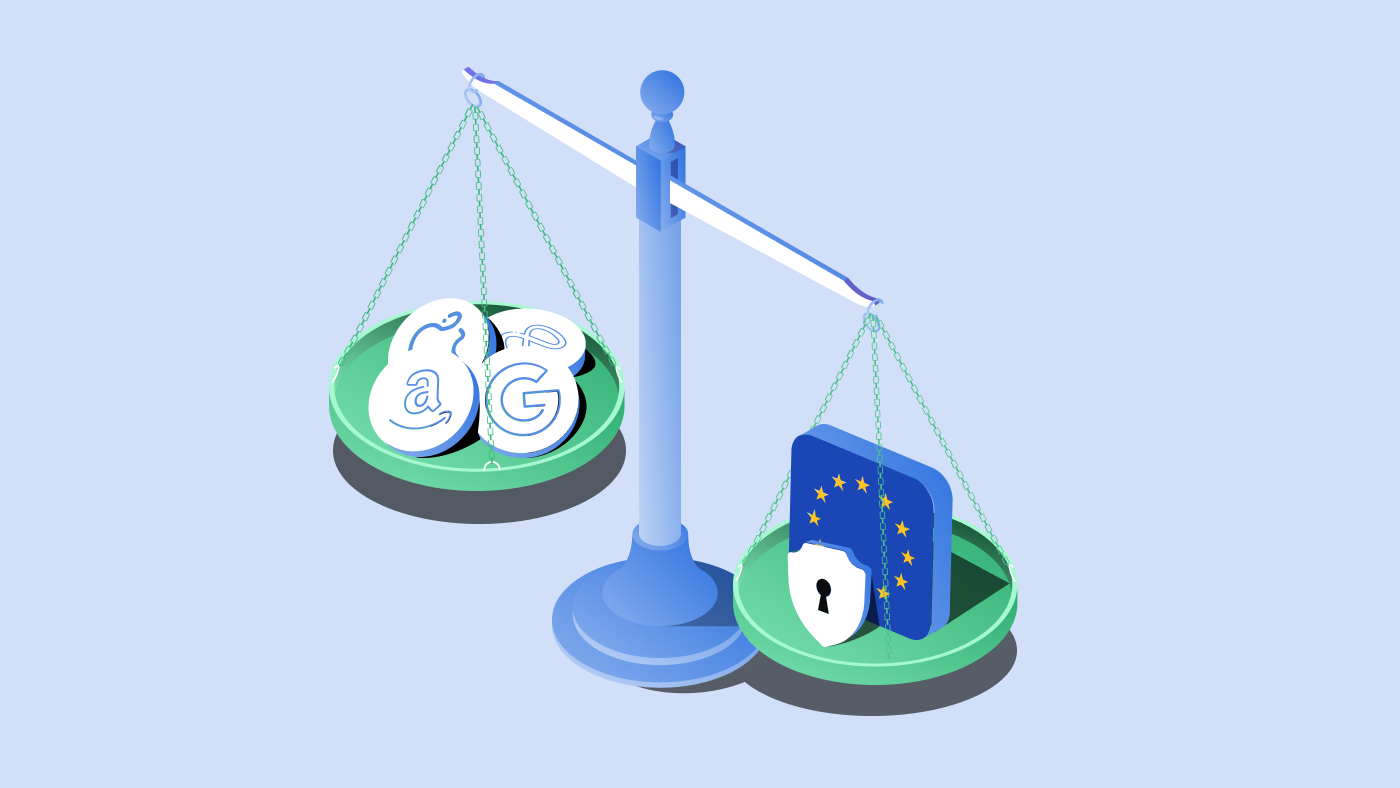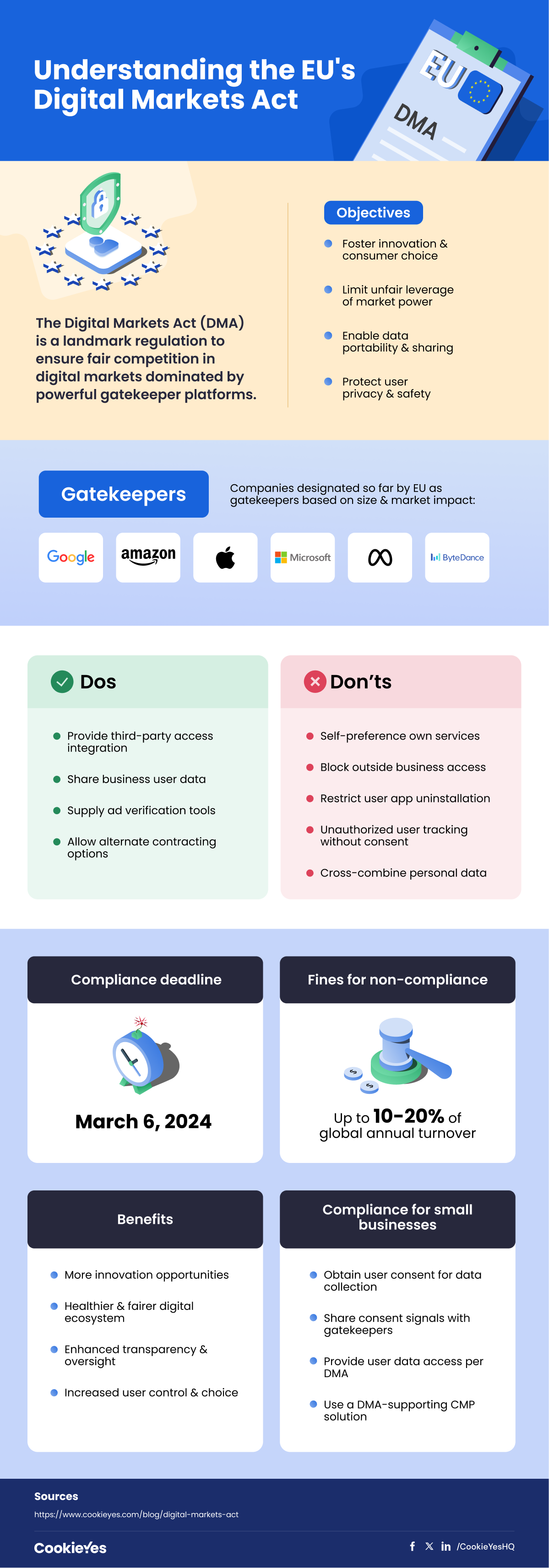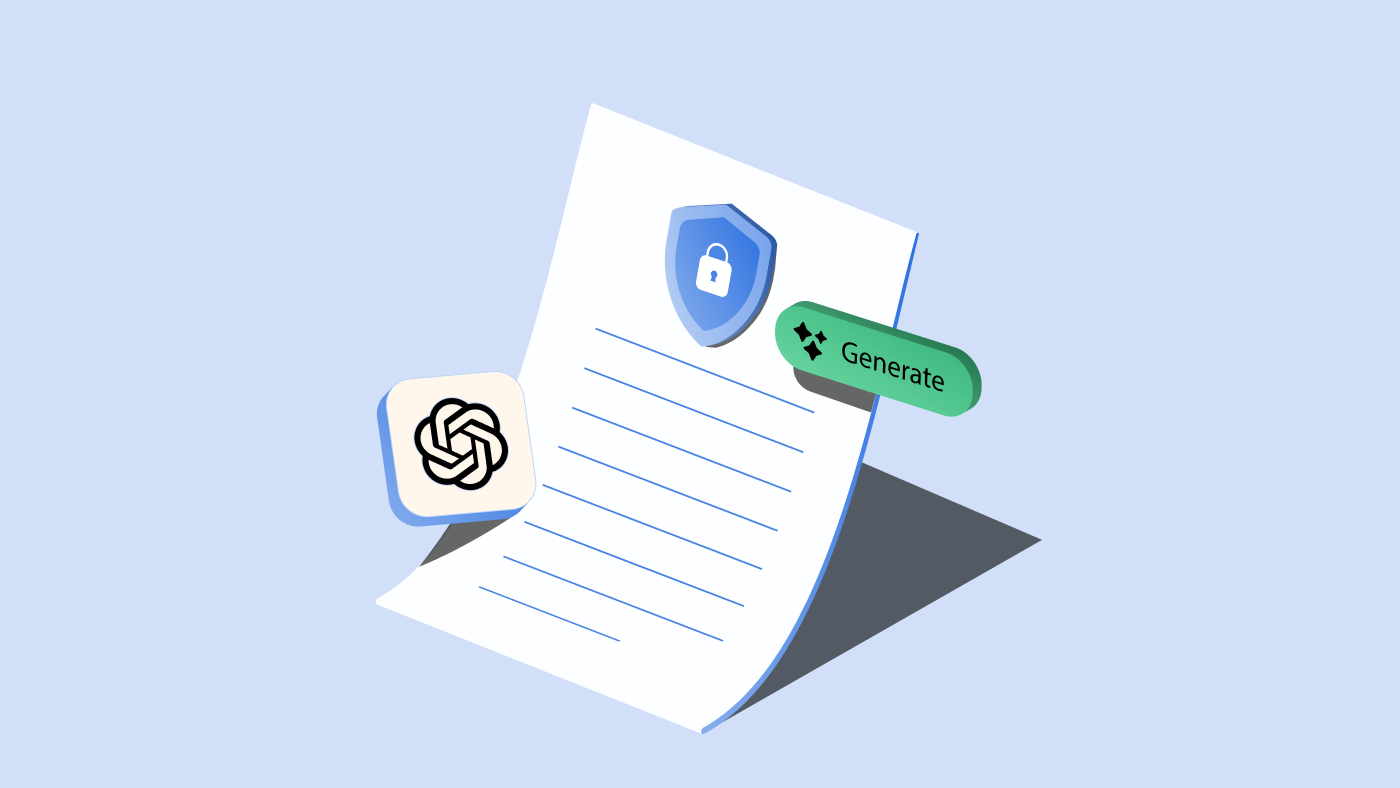For long, big techs have enjoyed their monopoly in the digital ad tech world. However, the European Union has disrupted this status quo. With the introduction of the Digital Markets Act (DMA), the EU aims to regulate large online platforms and foster fairer digital markets.
Originally published: 1 November 2022
Deadline for compliance: March 6, 2024
As a website or app owner, what does DMA mean for you?
Here’s an overview of what you need to know.
What is the Digital Markets Act?
The Digital Markets Act (DMA) is a set of regulations by the European Union to regulate how large online platforms use their services in the European digital markets. Published in October 2022, It came into force on 1 November 2022 and became applicable from 2 May 2023.
The main objective of the act is to ensure fair competition by prohibiting big techs from influencing the market and by allowing new players to enter the market. The large companies, known as “gatekeepers”, chosen by the Commission have until March 6, 2024, to comply with the DMA obligations.
DMA is enforced and supervised by the European Commission.
Who does DMA apply to?
The DMA targets large online intermediaries aka gatekeepers that have an outsized impact on the digital economy. Specifically, platforms that:
- Have significant economic power, market reach, and durability over multiple years
- Act as an important gateway between businesses and their potential customers
- Enjoy an entrenched position that is difficult to challenge
To qualify as a DMA gatekeeper, companies must:
- Reach over 45 million EU end users
- 10,000+ business users
- Have €7.5 billion+ in annual turnover
- Satisfy quantitative gateway position over the past 3 consecutive years
Any company meeting all three of these qualifying criteria across its EU operations must notify the European Commission within 2 months and will then undergo an official gatekeeper designation process. Failure to properly notify may still result in a forced designation if enough evidence exists.
In September 2022, the EU designated Meta/Facebook, Google, Apple, Amazon, Microsoft, and ByteDance as gatekeepers under the DMA. The regulation gives these companies six months from designation to achieve full compliance across their core digital services. The DMA categorizes its core platform services, such as search engines, social media, operating systems, and cloud infrastructure, and imposes rules to prevent unfair leverage of its gatekeeper position.
Designated gatekeepers have 6 months after designation to implement compliance with gatekeeper obligations before penalties apply.
What are DMA requirements?
The Act requires gatekeepers to take certain actions to enable fair competition. For instance, gatekeepers must:
- Provide third parties access to integrate with the gatekeeper’s services in specific situations
- Give business users access to the data generated by their platform activities
- Supply advertisers and publishers the tools to verify ads hosted on their platforms independently
- Allow business users to promote offers and close contracts outside the gatekeeper’s platform
Additionally, gatekeepers are prohibited from engaging in certain unfair tactics. For instance, gatekeepers cannot:
- Prioritize the gatekeeper’s services over comparable third-party services on their platform
- Block consumers from accessing businesses outside their platforms
- Prevent users from uninstalling pre-installed software or apps if desired
- Track end users outside the core platform for targeted advertising without consent
- Combining personal data from different services owned by the same company (e.g. Facebook and WhatsApp)
The regulations aim to constrain gatekeeper power, foster competition, enable user choice, and ensure fairness. The requirements mandate interoperability, data access, transparency, and choice while limiting self-preferencing, restrictions, forced bundling, and unauthorized tracking.
DMA timeline
July 2022
European Parliament and Council approve DMA text
October 12, 2022
Virginia Consumer Data Protection Act
November 1, 2022
DMA comes into effect
May 2, 2023
Majority of DMA rules start applying
September 6, 2023
European Commission designates 6 gatekeepers: Meta, Alphabet, Amazon, ByteDance, Apple, Microsoft
March 6, 2024
Deadline for gatekeepers to comply with obligations
2025
EC to update DMA based on market reports
May 2026
EC to assess DMA and propose amendments
What are the fines and penalties for DMA non-compliance?
The EU Commission can fine a gatekeeper up to 10% of its total worldwide turnover from the previous financial year if it intentionally or negligently fails to follow obligations (outlined in Articles 5, 6, and 7).
In certain cases, the Commission can impose fines of up to 20% of the gatekeeper’s total worldwide turnover from the previous financial year if the gatekeeper repeats the same infringement within 8 years.
The Commission has the authority to fine undertakings, including gatekeepers, and associations of undertakings up to 1% of their total worldwide turnover from the previous financial year for intentional or negligent non-compliance, such as failure to provide required information, comply with notification obligations, submit accurate information, provide access to data, comply with inspection-related obligations, introduce a compliance function, or meet conditions for access to the Commission’s file.
What does the DMA mean for your business?
While smaller websites and apps won’t have direct DMA obligations, the regulation aims to create spillover effects improving fairness and innovation. If you collect or use personal data (e.g. using cookies) through gatekeeper platforms or services, it is essential to obtain consent for it and signal the gatekeepers accordingly.
Use a DMA supporting CMP like CookieYes to ensure your use of cookies set by gatekeeper services or platforms is compliant.
Obtain cookie consent
and minimize legal risks
Get started with our DMA-supporting cookie consent solution
Try for Free14-day free trialCancel anytime
Benefits of DMA
- Enhances competition by creating a more level playing field for smaller businesses, encouraging fair competition.
- Provides more opportunities for startups to innovate in the digital space.
- Fairer treatment in search results and rankings, potentially increasing visibility.
- DMA promotes data access and interoperability, which could benefit website owners by allowing them to access performance metrics and data, facilitating better decision-making.
- Users’ privacy rights are better protected, potentially enhancing trust in online services.
- Website owners working with advertisers and publishers may benefit from improved transparency and collaboration.
Checklist for DMA compliance
Here is a quick checklist for ensuring your website’s DMA compliance:
- Obtain clear consent from users for collecting or using their personal data
- Pass on consent signals to gatekeeper services that you integrate with (e.g. Google Consent Mode)
- Provide options for users to limit data sharing with gatekeepers
- Provide business users access to their data per DMA rules
- Ensure gatekeeper platforms and services in use comply with regulations
- Keep abreast of updates or changes in the gatekeeper’s policies
- Use a DMA-supporting consent management platform (CMP)
TLDR on Digital Markets Act [Infographics]
FAQ on Digital Markets Act
What is the Digital Market Act 2023?
The Digital Markets Act is a key EU regulation passed in 2022 that aims to ensure fair and contestable digital markets. It sets obligations and restrictions specifically for large gatekeeper platforms to prevent them from unfairly leveraging their power. Majority of the rules came into force on 2 May 2023.
The DMA aims to bring in anti-competitive behaviors by gatekeepers and give users more choice and information. It also harmonizes rules across the EU single market.
Who does the Digital Markets Act apply to?
The Digital Markets Act will apply primarily to large online platforms designated as gatekeepers by the European Commission. These gatekeepers have a significant impact on the EU’s digital economy and provide core platform services that serve as important gateways for business users to reach consumers.
Who are the gatekeepers of the Digital Market Act?
The Digital Markets Act designates certain large online platforms as “gatekeepers” based on size and impact in the market. Specifically, platforms need to:
- Have a significant impact on the EU’s internal market
- Provide a core platform service that serves as an important gateway for businesses to reach end users
- Enjoy an entrenched and durable position in the market
The European Commission has designated 6 gatekeepers so far: Google/Alphabet, Amazon, Apple, Meta, Microsoft, and ByteDance. These companies provide key platform services like search, social media, cloud network, and operating systems.
What does the Digital Services Act do?
The Digital Services Act regulates online intermediaries and platforms like marketplaces, social networks, app stores, content-sharing platforms, etc. Its main goals are to:
- Prevent illegal and harmful activities online
- Protect user safety and fundamental rights
- Create a fair and open online platform environment
It ensures transparency, more control for users, and stronger protection for children. It also harmonizes rules for digital service providers across the EU.
What is the difference between the Digital Services Act and the Digital Markets Act?
The DSA is cross-sector legislation covering digital services like e-commerce marketplaces, social media platforms, etc. It focuses on safety, transparency, and user rights.
As outlined in the DMA document, the Digital Markets Act targets large gatekeeper platforms like Google, Apple, etc. It aims to specifically regulate these companies to enable fair digital markets and curb anti-competitive behaviors.




